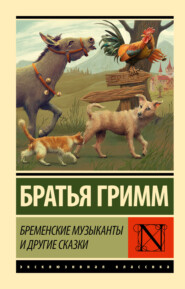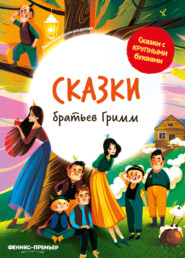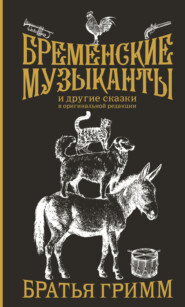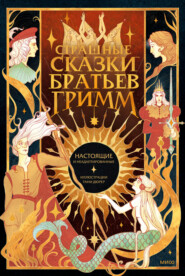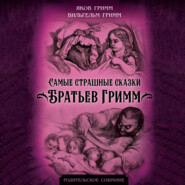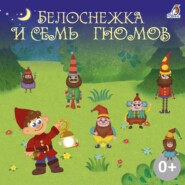По всем вопросам обращайтесь на: info@litportal.ru
(©) 2003-2025.
✖
Household Tales by Brothers Grimm
Настройки чтения
Размер шрифта
Высота строк
Поля
and went on eating without disturbing themselves. Hansel, who thought the roof tasted very nice, tore down a great piece of it, and Grethel pushed out the whole of one round window-pane, sat down, and enjoyed herself with it. Suddenly the door opened, and a very, very old woman, who supported herself on crutches, came creeping out. Hansel and Grethel were so terribly frightened that they let fall what they had in their hands. The old woman, however, nodded her head, and said, "Oh, you dear children, who has brought you here? Do come in, and stay with me. No harm shall happen to you." She took them both by the hand, and led them into her little house. Then good food was set before them, milk and pancakes, with sugar, apples, and nuts. Afterwards two pretty little beds were covered with clean white linen, and Hansel and Grethel lay down in them, and thought they were in heaven.
The old woman had only pretended to be so kind; she was in reality a wicked witch, who lay in wait for children, and had only built the little house of bread in order to entice them there. When a child fell into her power, she killed it, cooked and ate it, and that was a feast day with her. Witches have red eyes, and cannot see far, but they have a keen scent like the beasts, and are aware when human beings draw near. When Hansel and Grethel came into her neighborhood, she laughed maliciously, and said mockingly, "I have them, they shall not escape me again!" Early in the morning before the children were awake, she was already up, and when she saw both of them sleeping and looking so pretty, with their plump red cheeks, she muttered to herself, "That will be a dainty mouthful!" Then she seized Hansel with her shrivelled hand, carried him into a little stable, and shut him in with a grated door. He might scream as he liked, that was of no use. Then she went to Grethel, shook her till she awoke, and cried, "Get up, lazy thing, fetch some water, and cook something good for thy brother, he is in the stable outside, and is to be made fat. When he is fat, I will eat him." Grethel began to weep bitterly, but it was all in vain, she was forced to do what the wicked witch ordered her.
And now the best food was cooked for poor Hansel, but Grethel got nothing but crab-shells. Every morning the woman crept to the little stable, and cried, "Hansel, stretch out thy finger that I may feel if thou wilt soon be fat." Hansel, however, stretched out a little bone to her, and the old woman, who had dim eyes, could not see it, and thought it was Hansel's finger, and was astonished that there was no way of fattening him. When four weeks had gone by, and Hansel still continued thin, she was seized with impatience and would not wait any longer. "Hola, Grethel," she cried to the girl, "be active, and bring some water. Let Hansel be fat or lean, to-morrow I will kill him, and cook him." Ah, how the poor little sister did lament when she had to fetch the water, and how her tears did flow down over her cheeks! "Dear God, do help us," she cried. "If the wild beasts in the forest had but devoured us, we should at any rate have died together." "Just keep thy noise to thyself," said the old woman, "all that won't help thee at all."
Early in the morning, Grethel had to go out and hang up the cauldron with the water, and light the fire. "We will bake first," said the old woman, "I have already heated the oven, and kneaded the dough." She pushed poor Grethel out to the oven, from which flames of fire were already darting. "Creep in," said the witch, "and see if it is properly heated, so that we can shut the bread in." And when once Grethel was inside, she intended to shut the oven and let her bake in it, and then she would eat her, too. But Grethel saw what she had in her mind, and said, "I do not know how I am to do it; how do you get in?" "Silly goose," said the old woman, "The door is big enough; just look, I can get in myself!" and she crept up and thrust her head into the oven. Then Grethel gave her a push that drove her far into it, and shut the iron door, and fastened the bolt. Oh! then she began to howl quite horribly, but Grethel ran away, and the godless witch was miserably burnt to death.
Grethel, however, ran like lightning to Hansel, opened his little stable, and cried, "Hansel, we are saved! The old witch is dead!" Then Hansel sprang out like a bird from its cage when the door is opened for it. How they did rejoice and embrace each other, and dance about and kiss each other! And as they had no longer any need to fear her, they went into the witch's house, and in every corner there stood chests full of pearls and jewels. "These are far better than pebbles!" said Hansel, and thrust into his pockets whatever could be got in, and Grethel said, "I, too, will take something home with me," and filled her pinafore full. "But now we will go away." said Hansel, "that we may get out of the witch's forest."
When they had walked for two hours, they came to a great piece of water. "We cannot get over," said Hansel, "I see no foot-plank, and no bridge." "And no boat crosses either," answered Grethel, "but a white duck is swimming there; if I ask her, she will help us over." Then she cried,
"Little duck, little duck, dost thou see,
Hansel and Grethel are waiting for thee?
There's never a plank, or bridge in sight,
Take us across on thy back so white."
The duck came to them, and Hansel seated himself on its back, and told his sister to sit by him. "No," replied Grethel, "that will be too heavy for the little duck; she shall take us across, one after the other." The good little duck did so, and when they were once safely across and had walked for a short time, the forest seemed to be more and more familiar to them, and at length they saw from afar their father's house. Then they began to run, rushed into the parlour, and threw themselves into their father's arms. The man had not known one happy hour since he had left the children in the forest; the woman, however, was dead. Grethel emptied her pinafore until pearls and precious stones ran about the room, and Hansel threw one handful after another out of his pocket to add to them. Then all anxiety was at an end, and they lived together in perfect happiness. My tale is done, there runs a mouse, whosoever catches it, may make himself a big fur cap out of it.
16 The Three Snake-Leaves
There was once on a time a poor man, who could no longer support his only son. Then said the son, "Dear father, things go so badly with us that I am a burden to you. I would rather go away and see how I can earn my bread." So the father gave him his blessing, and with great sorrow took leave of him. At this time the King of a mighty empire was at war, and the youth took service with him, and with him went out to fight. And when he came before the enemy, there was a battle, and great danger, and it rained shot until his comrades fell on all sides, and when the leader also was killed, those left were about to take flight, but the youth stepped forth, spoke boldly to them, and cried, "We will not let our fatherland be ruined!" Then the others followed him, and he pressed on and conquered the enemy. When the King heard that he owed the victory to him alone, he raised him above all the others, gave him great treasures, and made him the first in the kingdom.
The King had a daughter who was very beautiful, but she was also very strange. She had made a vow to take no one as her lord and husband who did not promise to let himself be buried alive with her if she died first. "If he loves me with all his heart," said she, "of what use will life be to him afterwards?" On her side she would do the same, and if he died first, would go down to the grave with him. This strange oath had up to this time frightened away all wooers, but the youth became so charmed with her beauty that he cared for nothing, but asked her father for her. "But dost thou know what thou must promise?" said the King. "I must be buried with her," he replied, "if I outlive her, but my love is so great that I do not mind the danger." Then the King consented, and the wedding was solemnized with great splendour.
They lived now for a while happy and contented with each other, and then it befell that the young Queen was attacked by a severe illness, and no physician could save her. And as she lay there dead, the young King remembered what he had been obliged to promise, and was horrified at having to lie down alive in the grave, but there was no escape. The King had placed sentries at all the gates, and it was not possible to avoid his fate. When the day came when the corpse was to be buried, he was taken down into the royal vault with it and then the door was shut and bolted.
Near the coffin stood a table on which were four candles, four loaves of bread, and four bottles of wine, and when this provision came to an end, he would have to die of hunger. And now he sat there full of pain and grief, ate every day only a little piece of bread, drank only a mouthful of wine, and nevertheless saw death daily drawing nearer. Whilst he thus gazed before him, he saw a snake creep out of a corner of the vault and approach the dead body. And as he thought it came to gnaw at it, he drew his sword and said, "As long as I live, thou shalt not touch her," and hewed the snake in three pieces. After a time a second snake crept out of the hole, and when it saw the other lying dead and cut in pieces, it went back, but soon came again with three green leaves in its mouth. Then it took the three pieces of the snake, laid them together, as they ought to go, and placed one of the leaves on each wound. Immediately the severed parts joined themselves together, the snake moved, and became alive again, and both of them hastened away together. The leaves were left lying on the ground, and a desire came into the mind of the unhappy man who had been watching all this, to know if the wondrous power of the leaves which had brought the snake to life again, could not likewise be of service to a human being. So he picked up the leaves and laid one of them on the mouth of his dead wife, and the two others on her eyes. And hardly had he done this than the blood stirred in her veins, rose into her pale face, and coloured it again. Then she drew breath, opened her eyes, and said, "Ah, God, where am I?" "Thou art with me, dear wife," he answered, and told her how everything had happened, and how he had brought her back again to life. Then he gave her some wine and bread, and when she had regained her strength, he raised her up and they went to the door and knocked, and called so loudly that the sentries heard it, and told the King. The King came down himself and opened the door, and there he found both strong and well, and rejoiced with them that now all sorrow was over. The young King, however, took the three snake-leaves with him, gave them to a servant and said, "Keep them for me carefully, and carry them constantly about thee; who knows in what trouble they may yet be of service to us!"
A change had, however, taken place in his wife; after she had been restored to life, it seemed as if all love for her husband had gone out of her heart. After some time, when he wanted to make a voyage over the sea, to visit his old father, and they had gone on board a ship, she forgot the great love and fidelity which he had shown her, and which had been the means of rescuing her from death, and conceived a wicked inclination for the skipper. And once when the young King lay there asleep, she called in the skipper and seized the sleeper by the head, and the skipper took him by the feet, and thus they threw him down into the sea. When the shameful deed was done, she said, "Now let us return home, and say that he died on the way. I will extol and praise thee so to my father that he will marry me to thee, and make thee the heir to his crown." But the faithful servant who had seen all that they did, unseen by them, unfastened a little boat from the ship, got into it, sailed after his master, and let the traitors go on their way. He fished up the dead body, and by the help of the three snake-leaves which he carried about with him, and laid on the eyes and mouth, he fortunately brought the young King back to life.
They both rowed with all their strength day and night, and their little boat flew so swiftly that they reached the old King before the others did. He was astonished when he saw them come alone, and asked what had happened to them. When he learnt the wickedness of his daughter he said, "I cannot believe that she has behaved so ill, but the truth will soon come to light," and bade both go into a secret chamber and keep themselves hidden from every one. Soon afterwards the great ship came sailing in, and the godless woman appeared before her father with a troubled countenance. He said, "Why dost thou come back alone? Where is thy husband?" "Ah, dear father," she replied, "I come home again in great grief; during the voyage, my husband became suddenly ill and died, and if the good skipper had not given me his help, it would have gone ill with me. He was present at his death, and can tell you all." The King said, "I will make the dead alive again," and opened the chamber, and bade the two come out. When the woman saw her husband, she was thunderstruck, and fell on her knees and begged for mercy. The King said, "There is no mercy. He was ready to die with thee and restored thee to life again, but thou hast murdered him in his sleep, and shalt receive the reward that thou deservest." Then she was placed with her accomplice in a ship which had been pierced with holes, and sent out to sea, where they soon sank amid the waves.
17 The White Snake
A long time ago there lived a king who was famed for his wisdom through all the land. Nothing was hidden from him, and it seemed as if news of the most secret things was brought to him through the air. But he had a strange custom; every day after dinner, when the table was cleared, and no one else was present, a trusty servant had to bring him one more dish. It was covered, however, and even the servant did not know what was in it, neither did anyone know, for the King never took off the cover to eat of it until he was quite alone.
This had gone on for a long time, when one day the servant, who took away the dish, was overcome with such curiosity that he could not help carrying the dish into his room. When he had carefully locked the door, he lifted up the cover, and saw a white snake lying on the dish. But when he saw it he could not deny himself the pleasure of tasting it, so he cut off a little bit and put it into his mouth. No sooner had it touched his tongue than he heard a strange whispering of little voices outside his window. He went and listened, and then noticed that it was the sparrows who were chattering together, and telling one another of all kinds of things which they had seen in the fields and woods. Eating the snake had given him power of understanding the language of animals.
Now it so happened that on this very day the Queen lost her most beautiful ring, and suspicion of having stolen it fell upon this trusty servant, who was allowed to go everywhere. The King ordered the man to be brought before him, and threatened with angry words that unless he could before the morrow point out the thief, he himself should be looked upon as guilty and executed. In vain he declared his innocence; he was dismissed with no better answer.
In his trouble and fear he went down into the courtyard and took thought how to help himself out of his trouble. Now some ducks were sitting together quietly by a brook and taking their rest; and, whilst they were making their feathers smooth with their bills, they were having a confidential conversation together. The servant stood by and listened. They were telling one another of all the places where they had been waddling about all the morning, and what good food they had found, and one said in a pitiful tone, "Something lies heavy on my stomach; as I was eating in haste I swallowed a ring which lay under the Queen's window." The servant at once seized her by the neck, carried her to the kitchen, and said to the cook, "Here is a fine duck; pray, kill her." "Yes," said the cook, and weighed her in his hand; "she has spared no trouble to fatten herself, and has been waiting to be roasted long enough." So he cut off her head, and as she was being dressed for the spit, the Queen's ring was found inside her.
The servant could now easily prove his innocence; and the King, to make amends for the wrong, allowed him to ask a favor, and promised him the best place in the court that he could wish for. The servant refused everything, and only asked for a horse and some money for traveling, as he had a mind to see the world and go about a little.
When his request was granted he set out on his way, and one day came to a pond, where he saw three fishes caught in the reeds and gasping for water. Now, though it is said that fishes are dumb, he heard them lamenting that they must perish so miserably, and, as he had a kind heart, he got off his horse and put the three prisoners back into the water. They quivered with delight, put out their heads, and cried to him, "We will remember you and repay you for saving us!"
He rode on, and after a while it seemed to him that he heard a voice in the sand at his feet. He listened, and heard an ant-king complain, "Why cannot folks, with their clumsy beasts, keep off our bodies? That stupid horse, with his heavy hoofs, has been treading down my people without mercy!" So he turned on to a side path and the ant-king cried out to him, "We will remember you – one good turn deserves another!"
The path led him into a wood, and here he saw two old ravens standing by their nest, and throwing out their young ones. "Out with you, you idle, good-for-nothing creatures!" cried they; "we cannot find food for you any longer; you are big enough, and can provide for yourselves." But the poor young ravens lay upon the ground, flapping their wings, and crying, "Oh, what helpless chicks we are! We must shift for ourselves, and yet we cannot fly! What can we do, but lie here and starve?" So the good young fellow alighted and killed his horse with his sword, and gave it to them for food. Then they came hopping up to it, satisfied their hunger, and cried, "We will remember you – one good turn deserves another!"
And now he had to use his own legs, and when he had walked a long way, he came to a large city. There was a great noise and crowd in the streets, and a man rode up on horseback, crying aloud, "The King's daughter wants a husband; but whoever sues for her hand must perform a hard task, and if he does not succeed he will forfeit his life." Many had already made the attempt, but in vain; nevertheless when the youth saw the King's daughter he was so overcome by her great beauty that he forgot all danger, went before the King, and declared himself a suitor.
So he was led out to the sea, and a gold ring was thrown into it, in his sight; then the King ordered him to fetch this ring up from the bottom of the sea, and added, "If you come up again without it you will be thrown in again and again until you perish amid the waves." All the people grieved for the handsome youth; then they went away, leaving him alone by the sea.
He stood on the shore and considered what he should do, when suddenly he saw three fishes come swimming towards him, and they were the very fishes whose lives he had saved. The one in the middle held a mussel in its mouth, which it laid on the shore at the youth's feet, and when he had taken it up and opened it, there lay the gold ring in the shell. Full of joy he took it to the King, and expected that he would grant him the promised reward.
But when the proud princess perceived that he was not her equal in birth, she scorned him, and required him first to perform another task. She went down into the garden and strewed with her own hands ten sacks-full of millet-seed on the grass; then she said, "To-morrow morning before sunrise these must be picked up, and not a single grain be wanting."
The youth sat down in the garden and considered how it might be possible to perform this task, but he could think of nothing, and there he sat sorrowfully awaiting the break of day, when he should be led to death. But as soon as the first rays of the sun shone into the garden he saw all the ten sacks standing side by side, quite full, and not a single grain was missing. The ant-king had come in the night with thousands and thousands of ants, and the grateful creatures had by great industry picked up all the millet-seed and gathered them into the sacks.
Presently the King's daughter herself came down into the garden, and was amazed to see that the young man had done the task she had given him. But she could not yet conquer her proud heart, and said, "Although he has performed both the tasks, he shall not be my husband until he has brought me an apple from the Tree of Life."
The youth did not know where the Tree of Life stood, but he set out, and would have gone on for ever, as long as his legs would carry him, though he had no hope of finding it. After he had wandered through three kingdoms, he came one evening to a wood, and lay down under a tree to sleep. But he heard a rustling in the branches, and a golden apple fell into his hand. At the same time three ravens flew down to him, perched themselves upon his knee, and said, "We are the three young ravens whom you saved from starving; when we had grown big, and heard that you were seeking the Golden Apple, we flew over the sea to the end of the world, where the Tree of Life stands, and have brought you the apple." The youth, full of joy, set out homewards, and took the Golden Apple to the King's beautiful daughter, who had no more excuses left to make. They cut the Apple of Life in two and ate it together; and then her heart became full of love for him, and they lived in undisturbed happiness to a great age.
18 The Straw, the Coal, and the Bean
In a village dwelt a poor old woman, who had gathered together a dish of beans and wanted to cook them. So she made a fire on her hearth, and that it might burn the quicker, she lighted it with a handful of straw. When she was emptying the beans into the pan, one dropped without her observing it, and lay on the ground beside a straw, and soon afterwards a burning coal from the fire leapt down to the two. Then the straw began and said, "Dear friends, from whence do you come here?" The coal replied, "I fortunately sprang out of the fire, and if I had not escaped by main force, my death would have been certain, – I should have been burnt to ashes." The bean said, "I too have escaped with a whole skin, but if the old woman had got me into the pan, I should have been made into broth without any mercy, like my comrades." "And would a better fate have fallen to my lot?" said the straw. "The old woman has destroyed all my brethren in fire and smoke; she seized sixty of them at once, and took their lives. I luckily slipped through her fingers."
"But what are we to do now?" said the coal.
"I think," answered the bean, "that as we have so fortunately escaped death, we should keep together like good companions, and lest a new mischance should overtake us here, we should go away together, and repair to a foreign country."
The proposition pleased the two others, and they set out on their way in company. Soon, however, they came to a little brook, and as there was no bridge or foot-plank, they did not know how they were to get over it. The straw hit on a good idea, and said, "I will lay myself straight across, and then you can walk over on me as on a bridge." The straw therefore stretched itself from one bank to the other, and the coal, who was of an impetuous disposition, tripped quite boldly on to the newly-built bridge. But when she had reached the middle, and heard the water rushing beneath her, she was, after all, afraid, and stood still, and ventured no farther. The straw, however, began to burn, broke in two pieces, and fell into the stream. The coal slipped after her, hissed when she got into the water, and breathed her last. The bean, who had prudently stayed behind on the shore, could not but laugh at the event, was unable to stop, and laughed so heartily that she burst. It would have been all over with her, likewise, if, by good fortune, a tailor who was traveling in search of work, had not sat down to rest by the brook. As he had a compassionate heart he pulled out his needle and thread, and sewed her together. The bean thanked him most prettily, but as the tailor used black thread, all beans since then have a black seam.
19 The Fisherman and His Wife
There was once on a time a Fisherman who lived with his wife in a miserable hovel close by the sea, and every day he went out fishing. And once as he was sitting with his rod, looking at the clear water, his line suddenly went down, far down below, and when he drew it up again he brought out a large Flounder. Then the Flounder said to him, "Hark, you Fisherman, I pray you, let me live, I am no Flounder really, but an enchanted prince. What good will it do you to kill me? I should not be good to eat, put me in the water again, and let me go." "Come," said the Fisherman, "there is no need for so many words about it – a fish that can talk I should certainly let go, anyhow," with that he put him back again into the clear water, and the Flounder went to the bottom, leaving a long streak of blood behind him. Then the Fisherman got up and went home to his wife in the hovel.
"Husband," said the woman, "have you caught nothing to-day?" "No," said the man, "I did catch a Flounder, who said he was an enchanted prince, so I let him go again." "Did you not wish for anything first?" said the woman. "No," said the man; "what should I wish for?" "Ah," said the woman, "it is surely hard to have to live always in this dirty hovel; you might have wished for a small cottage for us. Go back and call him. Tell him we want to have a small cottage, he will certainly give us that." "Ah," said the man, "why should I go there again?" "Why," said the woman, "you did catch him, and you let him go again; he is sure to do it. Go at once." The man still did not quite like to go, but did not like to oppose his wife, and went to the sea.
When he got there the sea was all green and yellow, and no longer so smooth; so he stood still and said,
"Flounder, flounder in the sea,
Come, I pray thee, here to me;
For my wife, good Ilsabil,
Wills not as I'd have her will."
Then the Flounder came swimming to him and said, "Well what does she want, then?" "Ah," said the man, "I did catch you, and my wife says I really ought to have wished for something. She does not like to live in a wretched hovel any longer. She would like to have a cottage." "Go, then," said the Flounder, "she has it already."
When the man went home, his wife was no longer in the hovel, but instead of it there stood a small cottage, and she was sitting on a bench before the door. Then she took him by the hand and said to him, "Just come inside, look, now isn't this a great deal better?" So they went in, and there was a small porch, and a pretty little parlor and bedroom, and a kitchen and pantry, with the best of furniture, and fitted up with the most beautiful things made of tin and brass, whatsoever was wanted. And behind the cottage there was a small yard, with hens and ducks, and a little garden with flowers and fruit. "Look," said the wife, "is not that nice!" "Yes," said the husband, "and so we must always think it, – now we will live quite contented." "We will think about that," said the wife. With that they ate something and went to bed.
Everything went well for a week or a fortnight, and then the woman said, "Hark you, husband, this cottage is far too small for us, and the garden and yard are little; the Flounder might just as well have given us a larger house. I should like to live in a great stone castle; go to the Flounder, and tell him to give us a castle." "Ah, wife," said the man, "the cottage is quite good enough; why should we live in a castle?" "What!" said the woman; "just go there, the Flounder can always do that." "No, wife," said the man, "the Flounder has just given us the cottage, I do not like to go back so soon, it might make him angry." "Go," said the woman, "he can do it quite easily, and will be glad to do it; just you go to him."
The man's heart grew heavy, and he would not go. He said to himself, "It is not right," and yet he went. And when he came to the sea the water was quite purple and dark-blue, and grey and thick, and no longer so green and yellow, but it was still quiet. And he stood there and said —
"Flounder, flounder in the sea,







